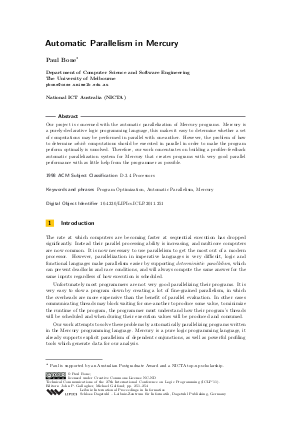Automatic Parallelism in Mercury
Author Paul Bone
-
Part of:
Volume:
Technical Communications of the 27th International Conference on Logic Programming (ICLP'11) (ICLP 2011)
Part of: Series: Leibniz International Proceedings in Informatics (LIPIcs)
Part of: Conference: International Conference on Logic Programming (ICLP) - License:
 Creative Commons Attribution-NonCommercial-NoDerivs 3.0 Unported license
Creative Commons Attribution-NonCommercial-NoDerivs 3.0 Unported license
- Publication Date: 2011-06-27
File

PDF
LIPIcs.ICLP.2011.251.pdf
- Filesize: 251 kB
- 4 pages
Document Identifiers
Subject Classification
Keywords
- Program Optimization
- Automatic Parallelism
- Mercury
Metrics
- Access Statistics
-
Total Accesses (updated on a weekly basis)
0PDF Downloads0Metadata Views
Abstract
Our project is concerned with the automatic parallelization of Mercury programs. Mercury is a purely-declarative logic programming language, this makes it easy to determine whether a set of computations may be performed in parallel with one-anther. However, the problem of how to determine which computations should be executed in parallel in order to make the program perform optimally is unsolved. Therefore, our work concentrates on building a profiler-feedback automatic parallelization system for Mercury that creates programs with very good parallel performance with as little help from the programmer as possible.
Cite As Get BibTex
Paul Bone. Automatic Parallelism in Mercury. In Technical Communications of the 27th International Conference on Logic Programming (ICLP'11). Leibniz International Proceedings in Informatics (LIPIcs), Volume 11, pp. 251-254, Schloss Dagstuhl – Leibniz-Zentrum für Informatik (2011)
https://doi.org/10.4230/LIPIcs.ICLP.2011.251
BibTex
@InProceedings{bone:LIPIcs.ICLP.2011.251,
author = {Bone, Paul},
title = {{Automatic Parallelism in Mercury}},
booktitle = {Technical Communications of the 27th International Conference on Logic Programming (ICLP'11)},
pages = {251--254},
series = {Leibniz International Proceedings in Informatics (LIPIcs)},
ISBN = {978-3-939897-31-6},
ISSN = {1868-8969},
year = {2011},
volume = {11},
editor = {Gallagher, John P. and Gelfond, Michael},
publisher = {Schloss Dagstuhl -- Leibniz-Zentrum f{\"u}r Informatik},
address = {Dagstuhl, Germany},
URL = {https://drops.dagstuhl.de/entities/document/10.4230/LIPIcs.ICLP.2011.251},
URN = {urn:nbn:de:0030-drops-31828},
doi = {10.4230/LIPIcs.ICLP.2011.251},
annote = {Keywords: Program Optimization, Automatic Parallelism, Mercury}
}
